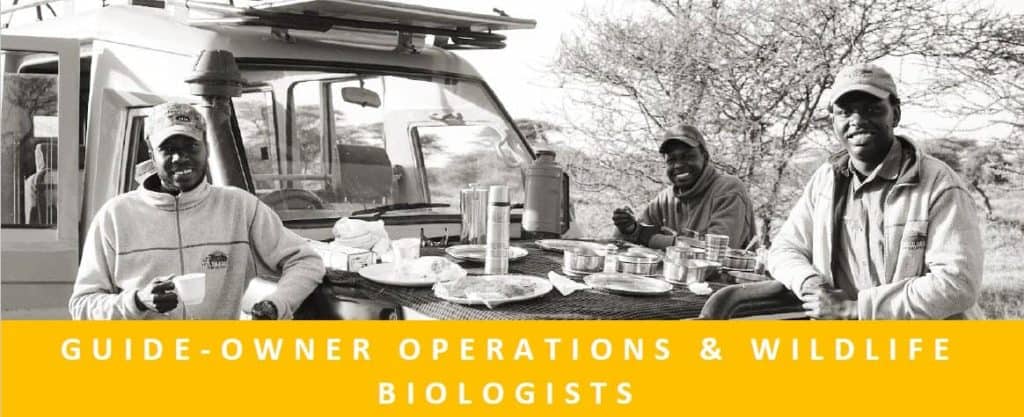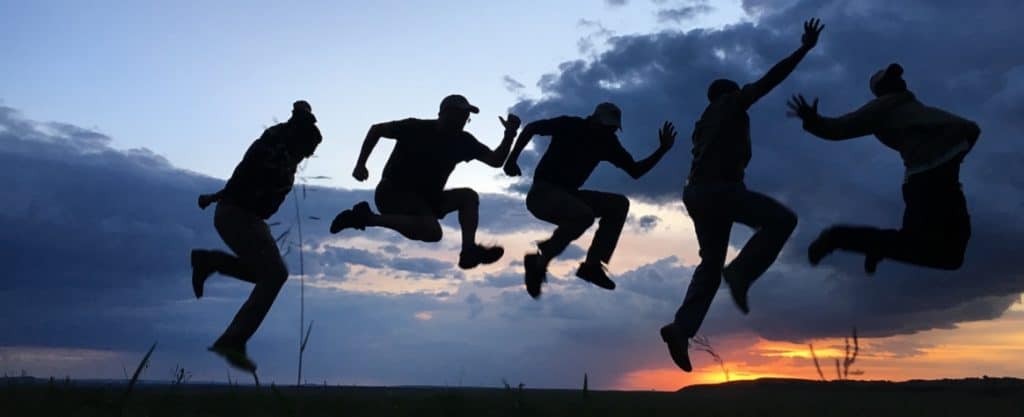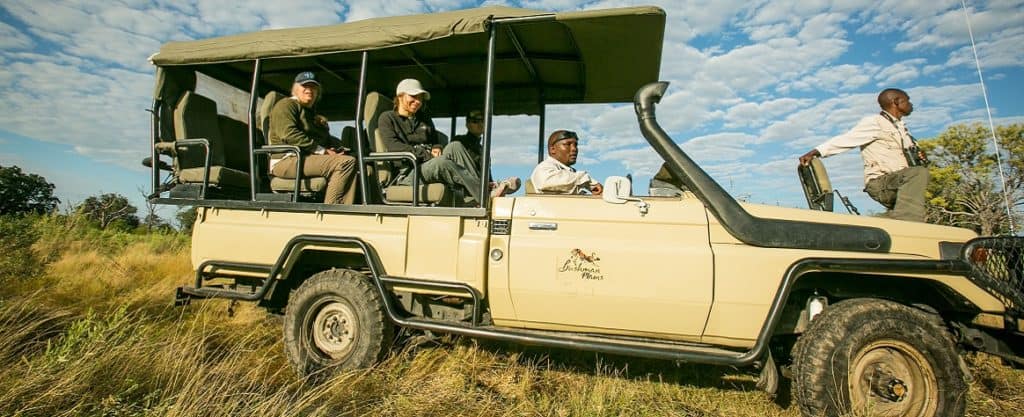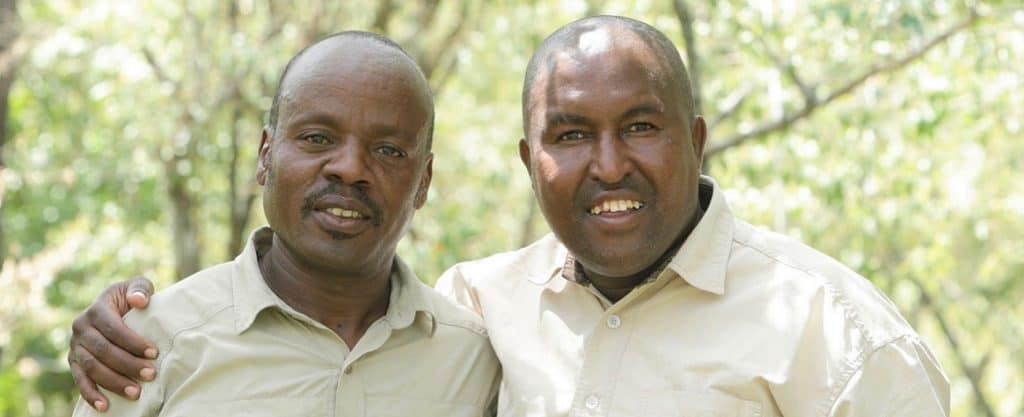Disruptive Empowerment
The Wild Source Innovation:
Disruptive Empowerment
Disruptive Empowerment is our solution-based approach to conservation tourism, disrupting the traditional safari camp model and empowering local partners to move beyond job opportunities and into ownership. The Wild Source and its wildlife biologist founder, Bill Given, have partnered with top local safari guides in Tanzania, Botswana and Kenya to create safari camps that include local guides as significant owners. The Wild Source has also provided strategic business support to remove barriers to success for the guides’ entrepreneurial freelance guiding ventures, including negotiating deals based on our buying power that reduced or eliminated the economic disadvantages of being a freelance guide. Both of these concepts were born out of the understanding that the guides are the heart of every great safari experience and that promoting them provides a service to the traveler while empowering local people.
The result is The Wild Source’s Disruptive Empowerment model: The skills and experience of the local expert guides become the capital that earns ownership shares, while the other partners raise the investment funds. The guides involved with The Wild Source are earning significantly more money than guides in the traditional safari camp model, and they are invested in long-term business ownership, allowing them to support themselves and their families and giving them more choices in life. This model leads to lasting wildlife conservation, as it becomes clear to local communities that the wildlife resource is delivering lucrative compensation and is worth preserving.

Tanzania – The Wild Source Tanzania and Njozi Camp
In 2009, The Wild Source partnered with local Tanzanian guide Deo Magoye, who is now 100 percent owner and Managing Director of The Wild Source Tanzania, a full ground/guide operation. When the partnership began, Deo owned one safari vehicle. Deo now owns a fleet of seven vehicles and employs a team of exceptional Tanzanian guides. In 2019, The Wild Source coordinated investment from two wildlife biologists, Bill Given and Kathy Frost, enabling Deo to fully own Njozi Camp, The Wild Source’s mobile camp in the Serengeti. In another initiative, Njozi Camp is the first and currently only Tanzanian safari camp to employ local wildlife biologists. The biologists conduct big cat research in the Serengeti under Bill’s tutelage, as he has been a big cat researcher for years, and engage camp guests in the project, joining in on game drives and adding valuable insight to the guests’ wildlife sightings. The biologist program has allowed The Wild Source to create jobs that were not previously part of the safari industry and to build critical local capacity in the wildlife biologist field that is needed for long-term conservation.

Botswana – Okavango Origins
At Okavango Origins, modern Bushman Guides and Trackers share 10,000 years of heritage in the place where their ancestors thrived. Born to the last generation of Okavango hunter-gatherers, our team was in the first generation of school educated Bushmen. The camp was designed to be movable but found a magical permanent location when it was selected to be the partner of the local Bukakhwe Cultural Community Trust located in Gudigwa Village in the northern Okavango Delta.

Kenya – Enaidura Camp and the Lalashe Guide Co-Op
Enaidura Camp is co-owned by two legendary guides, Johnson Pingua ‘Ping’ Nkukuu and Paul Kirui (of Maasai and Dorobo heritage, respectively) along with Bill Given and other investors. Both Ping and Paul are listed among the Top 25 Guides for all of Africa by Conde Nast Traveler. Paul is also the Chairman of the Kenya Guides Association. In 2019, Kenya Gold Level guide, Peter Kiyaa, joined the guide team at Enaidura Camp, making Enaidura home to three of the thirty or so Gold Level-certified guides in Kenya.
The Wild Source also helped start the Lalashe Guides Co-Op (‘Lalashe’ translates to ‘my brother’ in the Maasai Maa language), which helps entrepreneurial guides succeed in owning freelance guide businesses by providing access to special vehicles, marketing and reservations support, and negotiating with other Kenyan safari camps to allow the guides to compete on better footing.

The Problem with Traditional Safaris
Ecotourism, voluntourism and traveling with a purpose continue to gain popularity. We are pleased to work with conscientious travelers who are interested in sustainability and giving back to the local communities that they visit. However, it can be difficult for travelers to discern the best options, as the safari industry in general likes to tout its efforts in wildlife conservation and job creation.
Unfortunately, most of the benefits of safari tourism still go to foreign owners and operators. In the prevailing safari world, the compensation for guides does not recognize their vital importance – safari guides are the essential component in the safari experience, yet a guide’s monthly salary is often the equivalent (or less!) of the cost of one night in a luxury camp. At many luxury camps, expatriates are employed as managers rather than local people, and are typically paid two to three times what a local counterpart is paid.
At traditional salary levels, it is rare for safari guides to be able to earn the capital needed to become safari camp owners. Some successful guides can purchase (or more often, finance) a vehicle to start a freelance guiding business, but there are many barriers to entry, including how to market and compete for clients that mostly come from other countries; how to communicate with and plan for guests when the guide works exhaustive days in the bush; and the challenge of staying operational with only one or two vehicles in heavy use. Perhaps the largest barrier is the fact that visiting safari camps with a freelance guide often costs travelers more than staying at the same camp and using a camp-based guide.
Ultimately, lasting wildlife conservation can only be achieved if local people receive substantial economic benefits, and this is why we have worked to disrupt the traditional safari camp ownership model and empower the local guides.